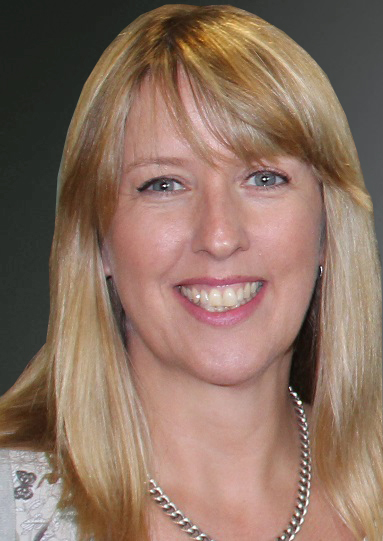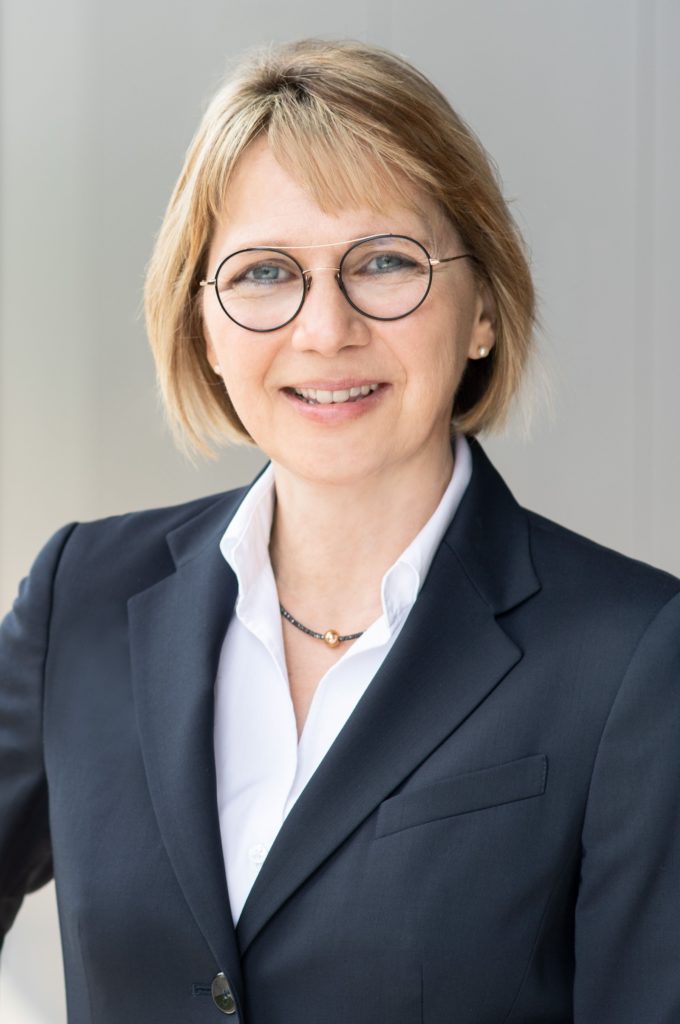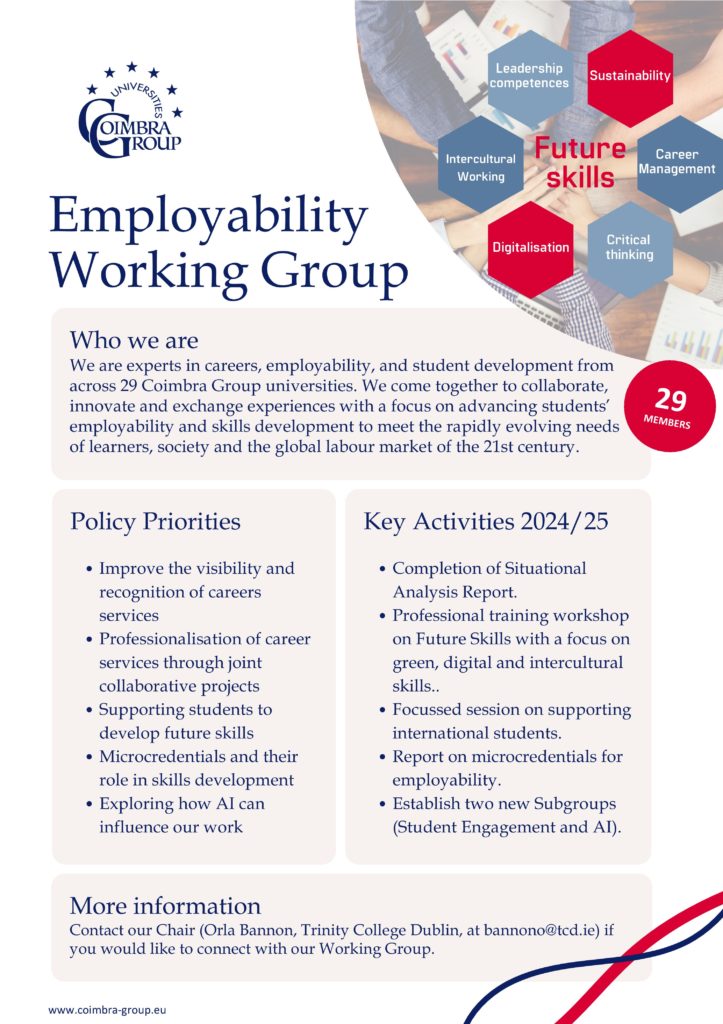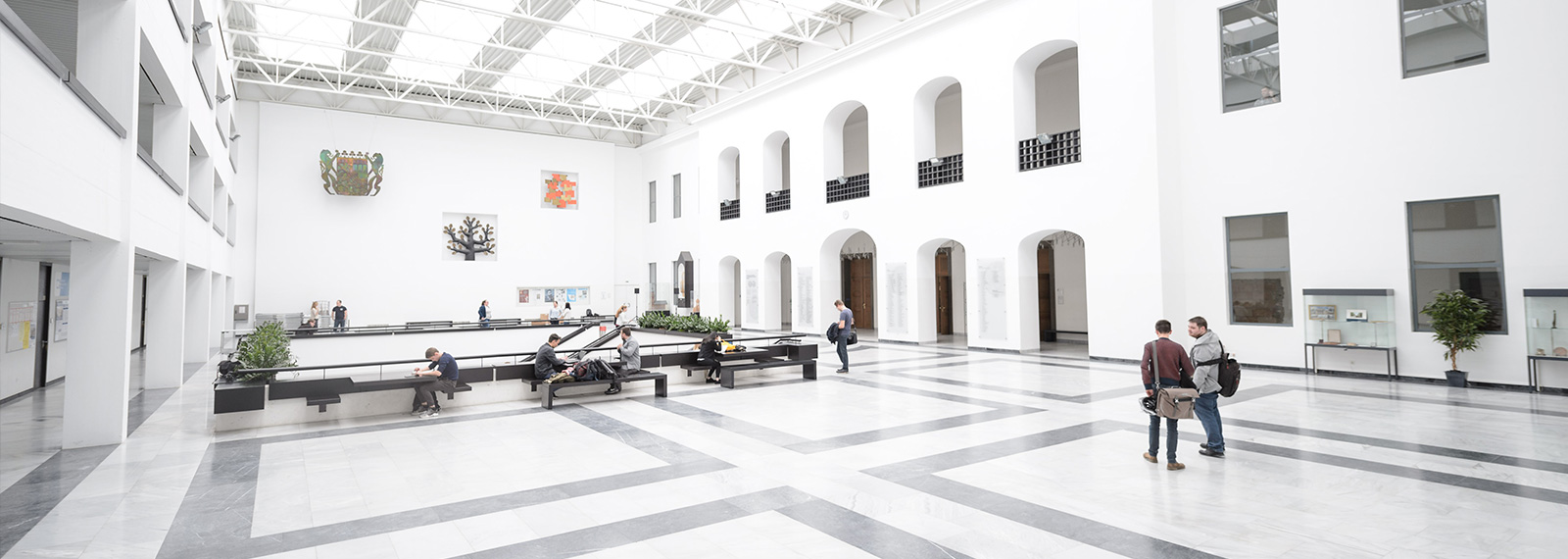Employability
Working Group
Chair: Orla Bannon

Orla Bannon is the Director of Careers at Trinity College Dublin. She has responsibility for managing the scale and quality of academic and student engagement with careers, as well as partnerships with employers, to deliver a truly world-class careers service at Trinity. She provides leadership to the Careers Team, promotes the value of the Careers Service across the University, and acts as a centre of expertise, advising and contributing to the University’s objectives in terms of employability and skills development, and the wider student experience.
Orla holds a degree in Biochemistry from Trinity, an MBA from UCD/RCSI and a Diploma in Personnel Management (NCI). She has over 25 years of management experience in both the public and private sectors in areas such as healthcare, higher education, IT and publishing.
Vice-Chair: Annette Retsch

Annette Retsch is head of the Career Centre at the University of Würzburg since its inception in 2007. Her responsibilities include the strategic direction of the development, planning, evaluation of about 100 transversal skills workshops and lectures every year. She specialises in individual career consulting and methods for sustainable professional development. Furthermore, she was responsible for the conceptual development of an individualised Virtual Exchange Program and allowing its embedding in curricula.
Prior to her commitment to employability activities, she graduated in German and English Studies with the state examination for the teaching profession at secondary schools and completed her PhD thesis in German and English linguistics on paratextual elements in German literature.
Focus of Working Group
We are living in fast-paced, dynamic, and uncertain times where economic, societal, and global needs are rapidly changing and where a highly skilled adaptable workforce is essential. A strong knowledge economy needs opportunities for lifelong skills development, which matches the skills needs of employers, both now and in the future. These skills allow for new value creation and problem solving addressing the challenges of our time. Continuous innovation and agility in higher education and research is required to futureproof the graduate pipeline with the skills that will allow society and industry to flourish and develop continuously.
Enhancing students’ employability to meet the rapidly evolving needs of learners, society and industry is now a core part of a higher education institution’s objectives. In this context, the collaboration and exchange of experiences within the Employability Working Group of the Coimbra Group (CG) aims to:
- Improve the visibility and recognition of the value of careers and employability services across CG universities;
- Increase joint collaborative projects on how career services are organised, deliver their services, and support their universities (professionalisation of career services);
- Prepare students for the 21st century global labour market and lifelong learning through the acquisition of key future skills.
We are an active Working Group which constantly seeks to identify new areas for conjoint work, to explore common issues and challenges across our universities, to share our learnings and drive innovation for the enhancement of our services.
Priorities for 2024-2026
- Increase awareness of the value and relevance of careers and employability services in CG universities through publications, workshops, and increased collaboration across the CG Working Groups.
- Develop a good practice framework for Careers Services working as consultants to academics (teachers, researchers, programme directors) and acting as facilitators of academic-enterprise engagement.
- Using our defined key future skills, explore how to support students to develop these both within and outside the curriculum, including tailoring to different student groups (e.g., students, doctoral students, international students, and students with the status of refugees).
- Explore how to improve student engagement with careers and employability services and ensure that our services remain relevant to students and meet their evolving needs.
- Increase our awareness and understanding of micro-credentials and the opportunities they present for careers, employability, and skills development within CG universities.
- Explore how AI can influence and enhance our service delivery and how we work.
Recent highlights
- Work has been ongoing over the past year on a Situational Analysis Report on employability and careers services across CG universities. This includes:
- Results from a benchmarking survey of EMP WG members carried out during Summer 2023.
- A detailed SWOT overview analysis based on inputs from EWG members aimed at identifying areas where we are doing well and the challenges we need to address.
- Research overview and recommendations on Skills for the Future of Work.
- Working Group members attended and actively contributed to several recent European Research Area Action 11 workshops on “The Green Transition and Working life”, “The Digital Transition and Working Life”, and “Twin Transitions and Vulnerable Groups” (ERA4FutureWork).
- An EC representative from DG EAC with expertise in Micro-credentials presented at our EMP WG meeting in Brussels in December 2023.
- Fruitful discussions around key areas of focus for the coming years resulted in updates to our work plan to include AI, improving student engagement, and how to involve others in our service delivery.
Ongoing/forthcoming activities
2024-2025
- Final approval of our Situational Analysis Report on Employability and Careers Services across CG Universities at the June 2024 meeting in Turku.
- Focussed discussion session on supporting international students to be held in June 2024 in Turku.
- Professional training workshop of Future Skills planned at Trinity College Dublin in Oct/Nov 24 (with Coimbra Group funding). This will allow for the development of specific skills training sessions based on the future skills already identified (focus on sustainability, digital, and intercultural working) and the targeting of this training for different student groups.
- Development of a good practice framework for Career Services for working with academics and supporting academic-enterprise engagement, e.g., work-based learning.
- Prepare an internal EMP WG report on micro-credentials and open badges (definitions, differences, relevance for employability, etc) to create a shared understanding by end 2024.
- Establishment of two new Subgroups and development of detailed plans to:
- improve student engagement with our services (Student Engagement Subgroup).
- explore how AI can influence and enhance our service delivery and how we work (AI Subgroup).
2025-2026
- Plan a joint seminar focussing on careers and employability services working to support PhD students – link with Doctoral Studies WG.
- Develop a toolbox of resources, materials, and guides for use in Future Skills training sessions with students.
- Map involvement and experiences on micro-credentials across EMP WG members including recommendations for the future.
- Advance work of the Student Engagement and AI Subgroups to deliver on planned objectives.
- Develop new strategies / exchange practices on supporting students with disabilities.
Contact person at the CG Office: Catarina Moleiro (moleiro@coimbra-group.eu)



